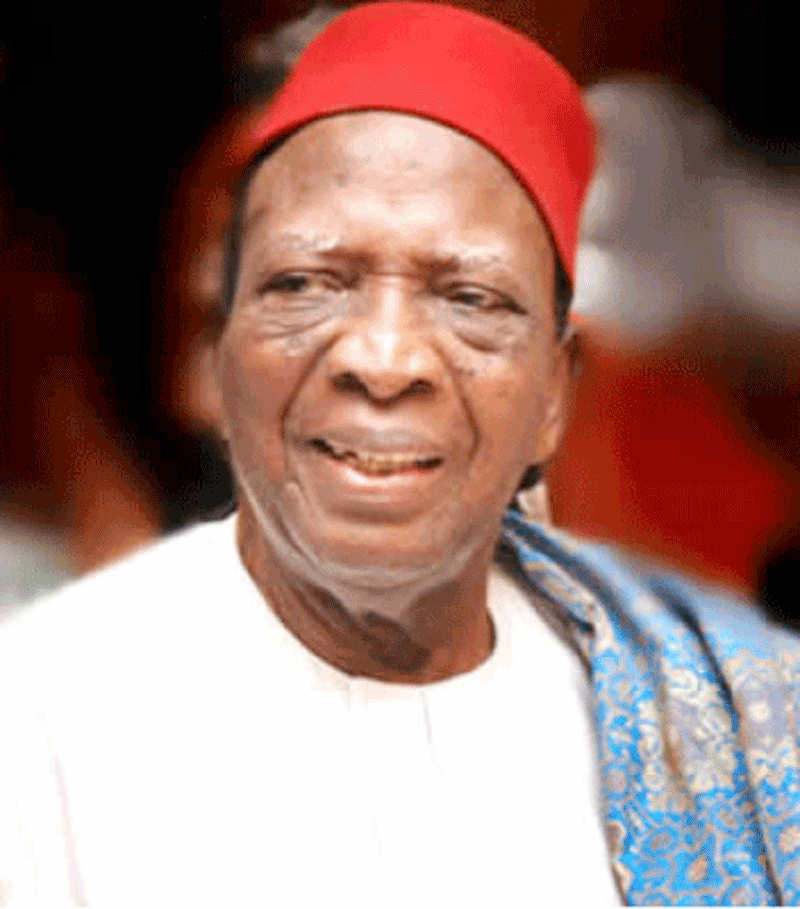By Professor Ben Nwabueze
The principle stated above is a salutary one, but its application is necessarily limited by inevitable exceptions.
We take, first, the power given by section 89(1)(c) of the Constitution to the Senate or the House of Representatives to “summon any person in Nigeria” to appear before it to address it on the state of the nation and to answer questions relating thereto. Relying on its power in that behalf, the House of Representatives on 25 January, 2018 summoned President Buhari to appear before it. I immediately decried the summons in a public statement, pointing out that, while the President is not expressly exempted from the power, he is not bound by it, on the ground that the President, as Head of State (section 130(2)) embodies, personifies or incarnates the Nigerian state, and, as such, does not come within the meaning of the term “any person in Nigeria”. His position as Head of State constitutes an exemption to section 89(1)(c), but the exception does not mean that he is above the law.
I further advised that, so long as President Buhari remains our Head of State, he must be accorded all the rights, pomp and dignity appertaining to the office, including the right to appear before the National Assembly whenever he chooses to do so, but not under a summons, defined by the dictionary as “a command or order by authority to appear,” and that when he does so appear before the Assembly for any purpose, he is there in state, i.e. as the state – what is called an act of state. Happily, my advice was heeded by the National Assembly, and the summons has not been pursued, and may not be issued again.
In more or less the same way as the President, as Head of State, incarnates the Nigerian State, so does the Senate President, as head of the National Assembly, incarnates the legislature i.e. the legislative arm of government, and the Chief Justice of Nigeria, as head of the judiciary, incarnates the Judicature, i.e. the judicial arm of government. The executive, legislature and judicature compose the Nigerian state. The head of each of the three arms of the government are entitled to, and must be accorded, all the rights, pomp and dignity appertaining to their offices.
Second, the recognition of “the essential co-equality” of the three arms of government, and the mutual respect by each of the rights, dignity and pomp due to the others is epitomized in the principle, the principle of the separation of powers, “that makes one master in his own house,” and precludes another organ from imposing its control on the other or others. “The independence of each organ requires that its proceedings shall be free from the remotest influence, direct or indirect, of either of the other two powers.” That is the U.S. Supreme Court expounding the principle of the separation of powers, one of the great pillars of our constitutional democracy.
The disgrace, degradation and embarrassment caused by the arraignment of the Chief Justice of Nigeria, the head of the third arm of government in the country, before the Code of Conduct Tribunal in the way and manner the arraignment was done in this case, is an affront not only to the doctrine of the separation of powers, as well as to the office of CJN and to whole country. To echo the words of President Buhari himself, reacting to the jeering he was given at the joint session of the National Assembly when he was there to present the 2019 budget, “the whole world is watching us.” Yes, the world is watching us as we needlessly subject the head of the third arm of our government to disgrace for a “misconduct” that is, in its nature, only technically a criminal offence.
With regard to the arraignment of the CJN before the CCT, it is misconceived to regard and treat the head of the third arm of our government in the same manner and in all respects as an ordinary citizen is treated, all in the name of the principle that all citizens are equal before the law, and that nobody is above the law. No exemption from the criminal law is thereby claimed for the CJN, but the way and manner of enforcing the law should accord due respect and decorum for the dignity attached to the office.
There is, third, the question whether the “misconduct” for which the CJN is arraigned before the Code of Conduct Tribunal (CCT) warrants and justifies the humiliation and disgrace meted to him. The Charge Sheet dated 10 January, 2019 indicts the CJN on a six count charge of “omitting or failure to declare” certain named assets in his Assets Declaration Form. All six counts are, in their nature, what may be described as technical offences in the sense that they involve no grave moral obloquy like fraud, stealing, receiving money or other valuable thing as gratification for performing or not performing an official act in favour of a person, other cases of corruption or corrupt practice truly so-called, homicide or other such heinous acts. The acts of which the CJN is accused are technical offences which, considering that the accused is the holder of the office of Chief Justice of Nigeria, could have been dealt with in a manner that would not expose the office, the country and its machinery of government to such disgrace and degradation.
Fourth. Prosecution for criminal offences is a very sensitive and volatile function capable of damaging the relations of the country with other countries and even its relations with influential communities and interests within the country. The exercise of the function is more volatile because of the wide range of officials charged with it – the Police and numerous other law-enforcement agencies. This makes the control of criminal prosecutions, a critical function of government, necessitating the vesting of the control of the function in a high official of the state by the name of Attorney-General who, as the Chief Law Officer of the Government, is expressly authorized by the Constitution to exercise the control (section 174). In exercising the control, the Constitution enjoins the Attorney-General to “have regard to the public interest” (section 174(3). The public interest consideration demands that, because of the sensitive and explosive nature of criminal prosecutions and its potentiality to impinge on the relations of government with other countries and with influential communities and interests within the country, the Attorney-General may need to take the matter to the highest level of the government. Hence section 174(2) requires him to exercise his power of control by himself personally or through officers of his department delegated by him.
The above constitutional requirement is reflected in the provision of the Code of Conduct Bureau and Tribunal Act that the “prosecutions for all offences referred to in this Act shall be instituted in the name of the Federal Republic of Nigeria by the Attorney-General of the Federation or such officers in the Federal Ministry of Justice as the AGF may authorize to do so.” (section 24(2) (emphasis supplied)
Without authorisation or delegation by the Attorney-General, the power of control given to him by the Constitution cannot be exercised by any officer in his Department – so held by the unanimous decision of all the seven participating justices of the Supreme Court in Att-Gen of Kaduna State v. Hassan (1985) 2 NWLR 983. In his concurring judgment in the cases, Uwais JSC said at pages 513 – 514:
“There can be no doubt that the powers given to the Attorney-General of a State under section 191 of the Constitution belong to him alone and not in common with the officers of the Ministry of Justice. Such Officers can only exercise the powers when they are specifically delegated to them by the Attorney-General. The delegation usually takes the form of a notice in the Official Gazette. As there was no Attorney-General appointed for Kaduna State at the time material to this case, his powers under section 191 could not have been delegated to the Solicitor-General.”
Amazingly, the decision of the Supreme Court in the Saraki case in 2016 made no reference to the decision of the court in the Hassan case. No attempt was made to give reasons for not following it or why it does not apply in the Saraki case.
With respect to the issue of the public interest in the present case, was the public interest ever taken into account in the decision to arraign the CJN before the CCT? Is it in the public interest that the accused, as head of the third arm of government, should be so arraigned for the technical offence of omitting or failing to declare certain named assets? Did the AGF sign the arraignment papers by himself or authorise an officer in his department to do so, from which the obligation arises on his part to have brought up the matter at the level of the government. This makes it wholly untenable to say that the President was unaware of the arraignment before it took place. If this is in fact the case, then, the government is not working the way it should.
The constitutional validity of the Law Officers Act 2004 is questionable.

